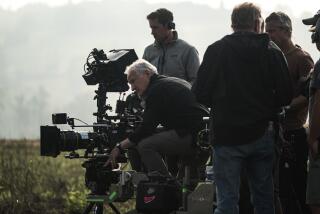From Missiles to Pacemakers
- Share via
Alfred E. Mann is one of those rare entrepreneurs who represents both the past and the future of the Los Angeles economy. The physicist got his start developing missile technology for the U.S. military and solar cells for the space program, transferring those skills to biomedicine decades before anyone had ever heard of the term “defense conversion.” He built Pacesetter Inc. into one of the world’s leading manufacturers of cardiac pacemakers before selling it in 1985. He since has founded a clutch of biomedical companies, including Sylmar-based MiniMed Inc., a maker of insulin pumps for diabetics, and Advanced Bionics Corp., whose cochlear implants are stimulating hearing in the deaf. At 73, Mann is chasing new treatments and cures for diabetes, cancer, blindness, AIDS and a host of other conditions. His latest endeavor is philanthropy. Last year Mann announced gifts totaling $200 million to fund biomedical research institutes at USC and UCLA. An incurable workaholic, Mann still puts in 90-hour weeks, which is exactly how he wants it. “My life is a fairy tale,” he says. “Only it’s real.” Mann was interviewed by Times staff writer Marla Dickerson.
Question: You made the transition from aerospace into biomedicine decades ahead of the downturn in defense contracting. How did you spot that market opportunity?
Answer: My company Spectrolab had been supplying the solar electric systems for virtually all of the free world’s spacecraft. One of our customers was Johns Hopkins University. Back in 1967 or thereabouts, pacemakers only lasted 18 to 21 months and they had to be replaced surgically. An engineer named Robert Fuschell of the university’s applied physics lab wanted to build a pacemaker using a rechargeable battery such as the ones used in spacecraft. They eventually went looking for a commercial partner. At that time we had other priorities that made more sense for Spectrolab, so we turned it down. Later I was in Washington on business and I made time to play tennis with Fuschell. We were pretty evenly matched, but on this day I was wiping up the court with him. I asked him what was wrong and he told me an accounting mistake had caused him to overspend on the pacemaker budget. There was no other money and the project might die. So I made a series of gifts to Johns Hopkins that allowed them to continue working on the project. A few months later, Fuschell was out here to visit Spectrolab. We went to an ice cream parlor in Westwood and ordered milkshakes. Sitting there talking he convinced me to get involved. So I ended up agreeing to start a new company which became Pacesetter.
Q: A milkshake convinced you to jump from spacecraft to pacemakers?
A: [Laughter] Well, during those days I was becoming more and more concerned about what I saw as the financial waste and politicizing of aerospace programs. There was a specific incident that got me so upset that I decided I would rather spend the rest of my career in medical products. We got passed over for a contract where we were ranked No. 1 technically and we were the lowest bidder, at half the price of our competitor. I was so upset I almost ran for Congress until a friend convinced me that I’d be frustrated. Anyway, it was the last straw and I decided I had had enough. I had done over 400 spacecraft, so it just wasn’t as exciting anymore.
Q: You are a physicist by training and you hold several patents. But a good scientist doesn’t necessarily make a good businessperson. How did you go about transforming yourself?
A: The bottom line is that you must recognize your weaknesses and you
Please see Mann, Page 19
Mann
Continued from Page 12
must hire people who fill out those areas where you don’t have the experience and talent. I’ve been very fortunate to pick good people.
I think maybe my most valuable asset is my enthusiasm for doing something better. I never really tried to create financial success for myself or for the company so much as I tried to do a better job. I developed a belief that if you do the job very well, treat people fairly and charge for your efforts in a proper manner that the money comes.
Q: The bioscience field is littered with companies that didn’t succeed. Is that simply the nature of your industry, given that many drugs and treatments won’t pan out in clinical trials?
A: There are many good ideas out there that don’t make it to market. When you’re talking about biotech, that’s a particularly risky path. You can’t know with certainty whether a drug that worked in mice is going to work on people. So there is more risk in the pharmaceutical arena than in any other area.
But there are many great ideas in all facets of business that don’t make it for a couple of reasons. The key, of course, is having enough capital. Capital is by far the most important ingredient for the success of a business, so that you can have the time to really bring the product to market successfully.
Leadership is also very important, in my view. If you are really trying to create a business where you are building off a team of people, you have to be able to lead that team, command their respect and, in the process, generate the commitment and loyalty it takes to make it a success.
Q: Given the steep odds of success, how do you determine which products to pursue?
A: We generally try to find an area that is underserved, typically one where the products aren’t state of the art, perhaps because of lack of competition or lack of focus on the part of the people there. I’ve found that companies tend to get very smug about what they are doing. They only react to competitive pressures.
For example, there were many entrants into the insulin infusion business in the early days. When Mini-Med set about building an external insulin pump, we didn’t try to set our standards based on what the competition was doing. After all, what the competition is doing today may not be what they’ll be doing three years from now when your product comes to market.
So we brought out a product that was significantly better than what the others had, supported it with a good marketing and sales effort, and caught the competition off guard. They weren’t prepared for this advance. They rushed products to market, had difficulties and ended up getting out of the business.
Q: In California, bioscience firms in the Bay Area and San Diego continue to attract the lion’s share of industry venture capital. What’s the outlook for growth in L.A.?
A: A lot of the infrastructure is already here. We’ve got three major universities [USC, UCLA and Caltech] with significant intellectual property and research. Mayor [Richard] Riordan and his business team have recognized that biotech and biomed are industries that bring good-paying jobs, clean jobs and a lot of export activity. So they’re very supportive. The Southern California Biomedical Council has held its first investors showcase. We presented 18 companies, and several hundred angels, corporations and venture people showed up. We’ll be doing that again next February. More angel groups are forming here, and I’m entertaining the idea of forming a venture group myself.
Q: There has been a lot of concern that the departure of major corporate headquarters from Los Angeles will create a void in the city’s cultural and philanthropic life. Were you trying to send a message or set an example with your gifts to USC and UCLA?
A: My primary intent was to find some way to bridge the gap between academic research and commercialization. There are plenty of people here with huge fortunes. What I don’t understand is why people with huge fortunes want to create even bigger fortunes. To me, money is only worth what can be achieved with its use. In my case, I want to use the funds to provide better medicine for mankind.
Alfred E. Mann will give a keynote address from 8:30 to 9:30 a.m. Sept. 24 at the Los Angeles Times Small Business Strategies Conference.
More to Read
Inside the business of entertainment
The Wide Shot brings you news, analysis and insights on everything from streaming wars to production — and what it all means for the future.
You may occasionally receive promotional content from the Los Angeles Times.










